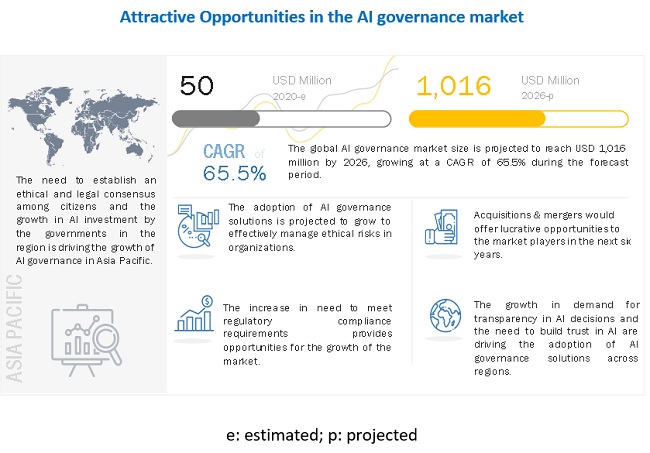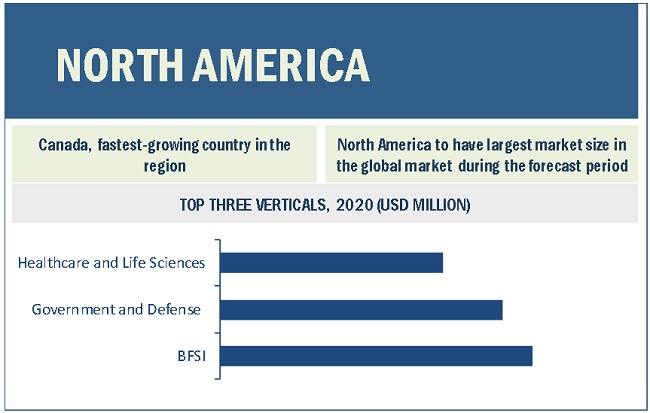< Key Hightlight >
The global AI governance market size to grow from USD 50 million in 2020 to USD 1,016 million by 2026, at a Compound Annual Growth Rate (CAGR) of 65.5% during the forecast period. Various factors such as increase in government initiatives to leverage the AI technology, rise in need for building trust in AI systems and growth in demand for transparency in AI decisions, and growth in regulatory compliances around the technology are expected to drive the adoption of the AI governance solutions and services.

To know about the assumptions considered for the study, Request for Free Sample Report
COVID-19 impact on global AI governance market
Managing and monitoring credit, market, liquidity, and operational risk across financial markets was hard enough with ongoing geopolitical tensions, international trade wars, and the occasional hurricanes and earthquakes. The current pandemic situation has forced chief risk officers and their teams to recalibrate old assumptions and models used to manage and monitor risk. COVID-19’s global impact has shown that interconnectedness plays an important role in international cooperation and how outdated technologies are obstacles to effective policymaking. As a result, many governments started rushing towards identifying, evaluating, and procuring reliable solutions powered by AI. Healthcare facilities globally have been turning toward AI systems to identify infections through people’s voices or chest x-rays. Various governments have proposed tracking tools to monitor the virus’ spread person-to-person. From Asia to Europe, several public sector entities have collaborated with the private sector to utilize AI-based services to monitor the spread of the virus. COVID-19 has accelerated the need to operationalize Ethical AI principles. In order to help practitioners, navigate these challenges, the World Economic Forum’s AI and ML platform created the Procurement in a Box package, which aims to unlock public sector adoption of AI through government procurement.
Market Dynamics
Driver: Increase in government initiatives to leverage the AI technology
With the growing advantages of AI, organizations and governments across the globe are taking various initiatives to adopt AI and ML technologies and to register as leaders in the global market. Therefore, government organizations from numerous countries are taking various initiatives to adopt AI governance solutions through establishing councils, developing new standards and guidelines, and designing frameworks. The major objective of governments behind adopting AI governance solutions is to protect privacy and civil liberties and build trust and confidence in AI technology among people. Therefore, many companies have formed committees to identify risk factors for AI technology in collaboration with AI solution providers, universities, and research labs.
Restraint: Establishment of comprehensive ethical principles for AI
The exponential growth in AI technology is driven by high computing power and increased growth in the volume of data. Organizations are increasingly investing their time, money, and intelligence to identify the enormous potential of AI and convert technology into tangible benefits, which can help organizations enhance their business productivity, build advanced products and services, and gain competitive advantages. However, AI outcomes may not be trustworthy owing to the black box problem, which leads to difficulties in maintaining transparency while using AI for most critical tasks, such as dealing with the customer’s personal data, financial data, and patient diagnosis. Therefore, to build a responsible and explainable AI system, many government agencies, research labs, and AI solution providers are conducting in-depth researches to build comprehensive ethical principles for AI technology.
Since 2017, many sets of principles and guidelines have been laid down by different government authorities, professional bodies, regulatory systems, and AI companies, which provide a basic stage to show the path for building strong AI regulations and help in identifying major ethical issues that need to be addressed. However, even after the proliferation of these principles, there are no guidelines that are comprehensive. For instance, if principles are protecting 1 important value and regulations are built to protect that value, another value is neglected, which may harm social ethics. Hence, establishing comprehensive ethical principles for AI, which covers all ethical values, can be a restraining factor for the current scenario of AI governance solutions.
Opportunity: Reduction in gender bias and discrimination through the use of AI
AI technology has transformed the current era with its ML and cognitive thinking abilities. It has made a positive impact on society through various use cases. However, there are some negative cases where AI provides a biased and discriminating output. Currently, AI technology is in the development stage, which learns from various types of data patterns and provides an output that is negative or positive. With the use of AI governance solutions, developers would be able to develop and monitor the ML algorithm, and train it through relevant data to avoid unwanted outcomes. The use of an AI governance solution is the only option for AI solution providers to prevent the reputational, financial, and data-related losses caused by unexplainable AI. Moreover, the use of ethical AI can help prevent the increasing gender gap and discrimination issues caused by black-box AI across various areas, such as recruitment processes and facial recognition.
Challenge: Inadequate AI expertise and skills
AI technology is used to transform traditional business approaches and redefine them to enhance the organization’s productivity and profit margins. However, organizations lack the AI skills and understanding that can help them design algorithms to govern the AI system. This is due to the complexity of neural networks and ML algorithms in the AI system and the unestablished regulatory environment for AI governance. In order to build critical ML models, it is better for an organization to have its skilled workforce. However, it is very difficult for organizations to hire or train AI-skilled employees. According to the Artificial Intelligence and Digital Talent Survey conducted by Willis Towers Watson, currently, there are 22,000 AI-trained professionals in the world. Organizations around the world are challenged by retention and increased attrition rate of skilled employees. Hence, inadequate AI expertise and skills pose a major challenge among organizations, which might reduce in the near future.
The integration services segment to grow at a higher CAGR during the forecast period
The consulting services segment is expected to account for the largest market size, while the integration services segment is projected to have the highest CAGR during the forecast period. The technicalities involved in implementing AI governance solutions and the need to integrate them into their client’s IT infrastructure would boost the growth of integration services.
North America to account for largest market size during the forecast period
The organizations in North America, especially the US, have leveraged the benefits of AI, ML, and deep learning technologies to stay ahead in the market. The region has well-established economies, which enable AI governance vendors to invest in new technologies. Furthermore, it is regarded as the center of innovation where major IT players are rolling out intelligent devices and collaborating with other companies in the AI governance market.

To know about the assumptions considered for the study, download the pdf brochure
Key Market Players
The AI governance vendors have implemented various types of organic and inorganic growth strategies, such as new product launches, product upgradations, partnerships and agreements, business expansions, and mergers and acquisitions to strengthen their offerings in the market. The major vendors in the global AI governance market include Alphabet Inc. (US), Microsoft Corporation (US), IBM Corporation (US), SAP SE (Germany), Salesforce.com, Inc. (Salesforce), Amazon Web Services, Inc. (US), QlikTech International AB (US), TIBCO Software Inc. (US), SAS Institute Inc. (US), Facebook, Inc. (US), FICO (US), Zest AI (US), Pymetrics Inc. (US), H2O.ai, Inc. (US), Informatica LLC (US), Ataccama Corporation (Canada), DataRobot, Inc. (US), Dataiku (US), Kyndi, Inc. (US), SparkCognition, Inc. (US), Fiddler Labs, Inc. (US), DarwinAI (Canada), Truera (US), Genie AI Ltd. (UK), MindsDB Inc. (US), integrate.ai Inc. (Canada), Untangle AI Pte Ltd (Singapore), AnotherBrain (France), Diveplane Corporation (US), and 2021.AI (Denmark). The study includes an in-depth competitive analysis of these key players in the AI governance market with their company profiles, recent developments, and key market strategies.
Scope of the Report
Report Metric | Details |
Market size available for years | 2020–2026 |
Base year considered | 2020 |
Forecast period | 2021–2026 |
Forecast units | USD Million |
Segments covered | Component, Deployment Mode, Organization Size, Vertical, And Region |
Geographies covered | North America, Europe, APAC, Rest of the World (Latin America and MEA) |
Companies covered | Alphabet Inc. (US), Microsoft Corporation (US), IBM Corporation (US), Amazon Web Services, Inc. (US), QlikTech International AB (US), TIBCO Software Inc. (US), SAS Institute Inc. (US), Facebook, Inc. (US), SAP SE (Germany), Salesforce.com, Inc. (Salesforce), FICO (US), Zest AI (US), Pymetrics Inc. (US), H2O.ai, Inc. (US), Informatica LLC (US), Ataccama Corporation (Canada), DataRobot, Inc. (US), Dataiku (US), Kyndi, Inc. (US), SparkCognition, Inc. (US), Fiddler Labs, Inc. (US), DarwinAI (Canada), Truera (US), Genie AI Ltd. (UK), MindsDB Inc. (US), integrate.ai Inc. (Canada), Untangle AI Pte Ltd (Singapore), AnotherBrain (France), Diveplane Corporation (US), and 2021.AI (Denmark) |
This research report categorizes the AI governance market based on components, deployment mode, organization size, vertical, and regions.
By Component:
- Solution
- Services
- Consulting
- Integration
- Support and Maintenance
By Deployment Mode:
By Organization Size:
- Large enterprises
- Small and medium-sized enterprises (SMEs)
By Vertical:
- BFSI
- Government and Defense
- Healthcare and Life Sciences
- Media and Entertainment
- Retail
- IT and Telecom
- Automotive
- Other Verticals (education, travel and tourism, energy and utilities, and manufacturing).
By Region:
- North America
- Europe
- UK
- Germany
- France
- Rest of Europe
- APAC
- China
- Japan
- India
- Singapore
- Rest of APAC
- Restof the World
Recent Developments:
- In December 2020, AWS announced nine new Amazon SageMaker capabilities. The new capabilities include faster data preparation, a purpose-built repository for prepared data, workflow automation, greater transparency into training data to mitigate bias and explain predictions, distributed training capabilities to train large models up to two times faster, and model monitoring on edge devices.
- In October 2020, H2O.ai brought AutoML with Driverless AI to Equifax Ignite. The platform would enable Equifax Ignite users to easily build and deploy ML models.
- In June 2020, IBM updated AI Fairness 360 (AIF360) toolkit and added two functionalities in AI Fairness 360 toolkit: compatibility with sci-kit-learn and R. AIF360 can be used to detect fairness issues at training time from Watson Studio and use Watson OpenScale to detect fairness at runtime.
- In June 2020, Informatica announced an update for the Intelligent Data Platform. The platform was designed to be powered by Informatica’s AI-powered CLAIRE engine.
- In March 2019, Zest AI launched the ZAML Fair AI tool to reduce bias from the ML algorithm, by applying it to existing models.
- In October 2018, IBM launched AI OpenScale, a data governance platform, which would help organizations build AI-based applications that provide a fair and unbiased outcome.
- In September 2018, Google launched ML technology-based What-If Tool, a feature of the TensorBoard web application.
- In May 2018, Pymetrics launched Audit AI tool that can audit a variety of algorithms, including those made to predict whether a person will pay back a loan or to assign a credit score to people with no banking history.
- In May 2018, Facebook launched a new product, the Fairness Flow tool, to reduce bias and discriminated outcomes during the case of job recommendation or while identifying fake social media accounts.




